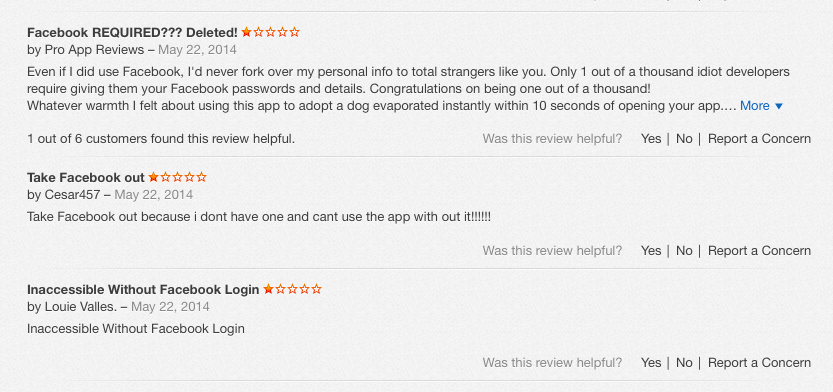
For years, Facebook users and app makers had an understanding: Use your account on the social network to log in, and we’ll all save a little time. The price seemed acceptable—even if Facebook was the ultimate winner, gaining insights into both consumer behavior and the mobile-app economy.
Now a growing sense of Facebook fatigue seems to threaten that balance, with users lashing out at apps that stick to Facebook for logins.
Barking Mad At Facebook

One new application, BarkBuddy, aims to make it easier for dogs to get adopted, and for humans to find a new best friend—but some people think it’s getting a little too friendly. The app, currently available for iPhones and iPads, requires a Facebook account and active location services before it shows users dogs in their area. The overwhelmingly negative comments on the App Store page echo the same thing: Requiring Facebook to use the application is bad.
BarkBuddy is an app you want to love (and it does have some five-star reviews along with one- and two-star pans). The application uses an interface similar to dating app Tinder. It lets you swipe left if you’re not interested in the dog shown, or right if you want to add the dog to your favorites. (After trying it a few times, I can tell you that it’s really hard to swipe left on any of them.)
The app’s design isn’t the only way in which it resembles dating apps. Like Tinder, BarkBuddy requires a Facebook account to log in. But that doesn’t make sense: While Tinder, the dating app BarkBuddy emulates, uses your Facebook account information to match you with friends of friends, dogs can’t even have Facebook profiles. And users may not feel comfortable with a stranger working at a shelter reviewing their Facebook account as part of the adoption process.
While BarkBuddy might be a cute way to save some animals’ lives, that’s not enough of a justification for some people.

Almost all of BarkBuddy’s one- and two-star reviews complain about the Facebook requirement.
A Requirement That’s Too In Your Facebook
Chris O’Brien, the communications director for Bark & Co., the company behind BarkBuddy, told me that Facebook login won’t be mandatory forever. The company plans to add email registration and the option to share via text message and Twitter in a future version. Facebook registration, however, will be a part of the preapproval process for adoption when the company implements that option, O’Brien said.
Lyft, the on-demand taxi service, relies on Facebook to verify the identities of drivers and passengers. The company wants to make sure drivers and passengers can recognize each other so no one gets into the wrong car. The company initially only used Facebook to verify the identity of users, but has since implemented an option that lets users connect with their phone number and email address.
It’s likely BarkBuddy aims to use personal information in a similar way to determine whether or not a person can provide a good home for a pet. That’s not likely to please users who say they don’t want to have a Facebook account in the first place.
So relying on Facebook to provide companies with accurate personal information is part of the problem. As people are increasingly wary of sharing their real identities with companies like Facebook and Google, the rationale for app developers to rely on those giants for to manage users’ identities becomes flawed.
Facebook recently launched a beta version of “Anonymous Login,” an option that lets people use their Facebook accounts to log into an app without revealing their names or other personal information. The problem: Even though applications won’t know your identity, Facebook will still be able to tell which applications you’re using.
It’s not services like BarkBuddy that people worry about as much as the disconcerting idea that social behemoth Facebook has access to virtually any app, and the data stored there.
We’ve started to move away from Facebook for messaging, relying on apps like Snapchat and WhatsApp instead. Perhaps the same erosion is happening with all of the apps in Facebook’s orbit.
BarkBuddy facilitates pet adoptions, a serious business that seems like it ought to require far more than a Facebook account to verify whether someone is responsible enough to own a pet.
For users who don’t connect with Facebook, Lyft now asks people to upload a Lyft profile image, rather than pulling it from their Facebook account—which very well might serve up a political protest symbol or a cute baby pic as a real photo. And the app could use other data from people’s phones, like location history and contact information, to get a sense of whether they’re a trustworthy passenger. Lyft may have thought it needed Facebook when it launched, but it’s clear it can get by without it now.
It’s understandable that some applications need your real identity in order to operate. But by conflating “real identity” with a Facebook account, companies alienate a set of users who don’t want Facebook to know which applications they’re using. In order to appeal to the largest possible audience, app developers are going to have to offer alternatives to Facebook, and let people decide for themselves whether they’re comfortable with Facebook knowing every little icon they tap on their phone.
Update 10:13 a.m. : An earlier version of this story did not mention Lyft’s option to login with a phone number and email address.
Lead image by Found Animal Foundation; other images via BarkBuddy and Apple
















